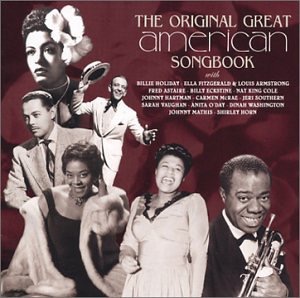TheGreatAmericanSongbook

"That's where our innate greatness always resided."
When my contemporaries were busy imprinting on GlamRock and headbanger Southern blues, I was distracted listening to old Frank Sinatra tapes, imprinting on the music made for a generation or two before mine; The Great American Songbook. I studied the life of Jimmy Van Heusen, the songwriter that The Chairman of the Board wanted to be when he grew up, memorized Johnny Mercer lyrics, collected Cole Porter records, and pined after the long lost nineteen thirties, a time a couple of decades before I was even born. I instantly recognize Dinah Washington's voice, pitch perfect and reputed to never, ever having required more than a single take to make a perfect rendition. I listen to Hot Jazz Saturday Night on Washington DC's venerable public radio station WAMU almost every Saturday evening and tune in to John Pizzarelli and Jessica Molaskey's Radio Deluxe every week. ©2018 by David A. Schmaltz - all rights reserved
When some popular recording artist of the seventies, eighties, nineties and so on passes on, I invariably never managed to sit through a thing they recorded. I'm quietly shocked that my banker listened to Prince or David Bowie, both of whom seemed to be struggling wannabes who never spoke to me compared to the Gershwins or Tony Bennett. I consider Dave Frishberg to be an American treasure. Even that guy who wrote all those songs for Sesame Street, Bob Dorough, wrote better melodies than ninety percent of all the songwriters ever hustling since Tin Pan Alley rolled up its sidewalks.The Muse programmed in the presets for the "oldies" 60s and 70s radio stations, but they play songs I mostly hear for the first time when I'm unfortunate enough to be riding shotgun when she's driving. I'm more of a 40s and 50s guy.
I love the lyrics, which seem to perform the role of closed-captioning my life. This morning, listening in to Radio Deluxe as we ran Saturday morning provisioning rounds, we heard a dandy rendition of You're Never Fully Dressed Without A Smile performed by Harry Connick, Jr:
"So Senator, so janitor, goodbye for a while,
Because You're Never Fully Dressed Without A Smile!"
I didn't simply smile as I listened, I grinned, from slightly behind one ear to quite a ways beyond the other. What tremendous wisdom! Not folk wisdom so much as cosmopolitan wisdom, an acknowledgement that could serve me as well on upper Park Avenue as in a crumbling trailer park. This characteristic separates the lyric quality of The Great American Songbook from the wisdoms offered in folk, rock, country, or rap. It seems universal, including the long tails of society, whether those tails be a tuxedo's or old an hound dog's. Many of the verses themselves carry a subtle complexity, too, playing with cadence and rhyme rather than simply adhering to them. Johnny Mercer and Cole Porter were both notorious for imbedding multiple entendre and not merely to hoodwink censors, but, it seems to me, to make me smile, or more properly grin when I catch on that my chain is being yanked again.
I have often wondered if any Great American Songwriter ever took their craft seriously, since so many of the really great examples seem to carry tremendous ambiguity. In the middle of some moving confession of eternal love, a scuffed shoe shuffles in. This quality, which I attribute to the tragicomic language so often native to Yiddish humor, moves me deeply. It seems to better represent the real nature of love and of relationships. We laugh, we cry, we love, we die. No reason to take any of this any more seriously than it warrants. Hell, Harry Warren found a voice to mock The Great Depression while imbedded in the middle of it!
I believe that The Great American Songbook holds what seems truly great about America. A clarinet swoops and screams at the dawn of a great world war and repeatedly reassures us until it's finally over. It embodies the spirit, which the Nazi's despised, a dancing-even-if-we're-gonna-die defiance of the world as it was reported to have really been. We, The Great American Songbook, beg to differ. We become who we assert ourselves to be. In the Great American Songbook, gay men and women produced perhaps the finest romantic lyrics in the history of the world, lyrics that still seem perfectly capable of getting the old Begine to begin all over again, regardless of anyone's sexual orientation. The Great American Songbook sings in a universal tongue.
I'm not beyond sniffling my way through a decent Country song, though it seems to always be the same old dawg. They say that every Blues song morns the same one who always leaves you. Rap? Who could possibly interpret anything in there? The Great American Songbook seems to deal exclusively in universals. Chromatic rather than simply tonic. Multipli-tempoed. Smart-assed in the face of the most serious situations. Sometimes simply silly, Wishing Upon A Star; often inspiringly wise. Sometimes self-deprecating, intelligent above all else. If we aspire to make America great again, I think we might consider just how great we already are. We, (well, often Eastern European immigrants' offspring and slaves' grandchildren) created our greatness and those creations have been accumulating for a century. With A Song In My Heart. That's where our innate greatness always resided.


